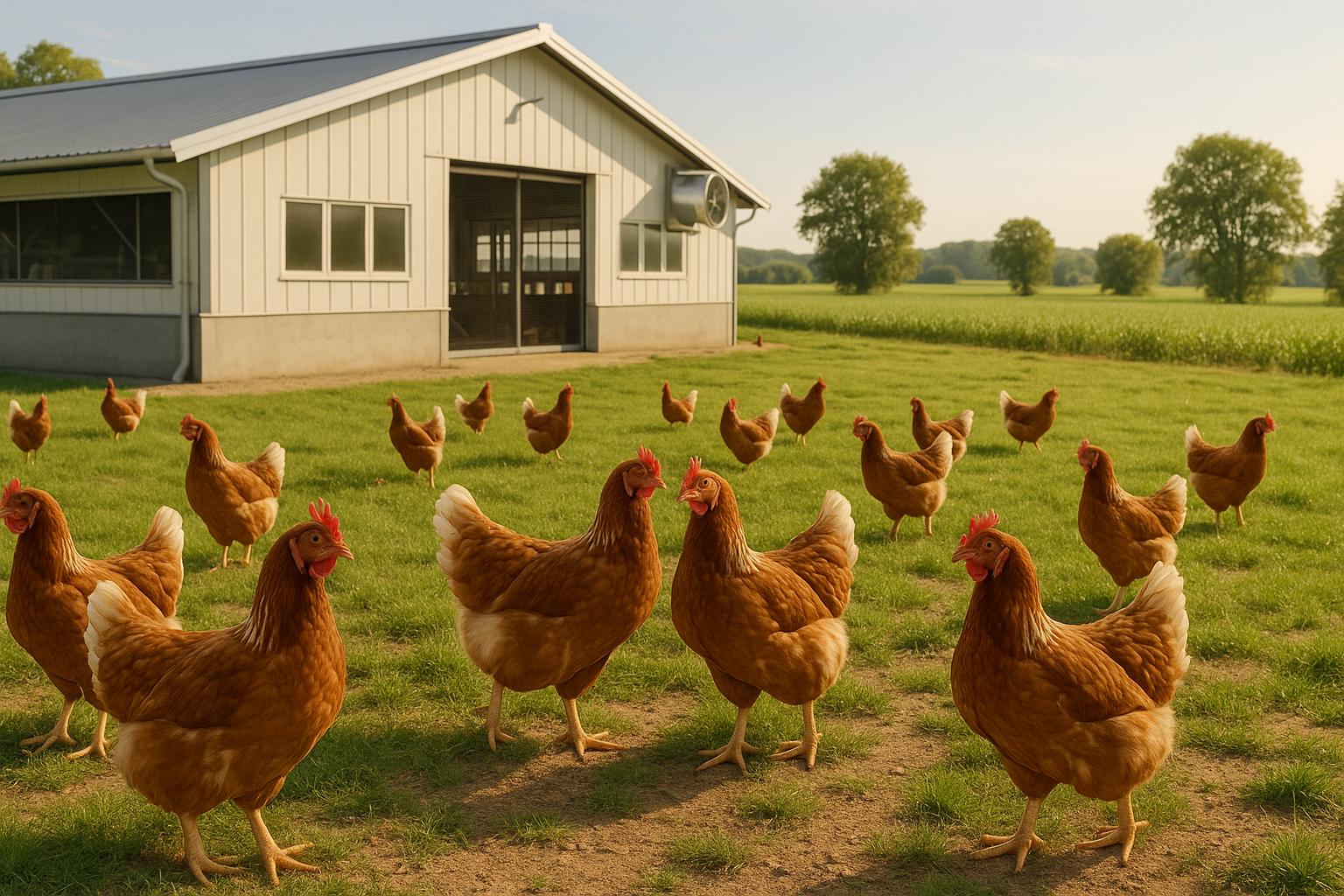Want to meet integrator requirements and protect your poultry operation? Here's what you need to know:
- Integrators manage the poultry production chain and provide growers with chicks, feed, and support. Growers handle land, labor, and facilities.
- Facility Standards: Maintain climate-controlled houses with automated systems, backup power, and biosecurity measures.
- Insurance Requirements: Two key policies are essential:
- Care, Custody, and Control (CCC): Covers losses related to livestock care.
- Business Income (BI): Protects against revenue loss during disruptions.
- Stay Compliant: Regularly review insurance policies, keep detailed records, and meet contract standards.
Protect your farm and ensure smooth operations by focusing on insurance, facility upkeep, and documentation.
What Integrators Require
Building and Equipment Standards
Poultry growers are expected to maintain facilities that align with current industry standards. This means having climate-controlled poultry houses outfitted with automated systems for feeding, watering, and ventilation. Backup power systems and emergency alert mechanisms are crucial to ensure continuous operations and safeguard bird health. Regular maintenance and timely upgrades are necessary to stay aligned with integrator expectations. These facility standards also create a foundation for strict safety measures.
Safety and Health Guidelines
Protecting flock health and ensuring food safety require strict biosecurity and welfare practices. Integrators typically expect growers to control access to facilities, maintain high sanitation standards, and implement effective pest control measures. Regular health checks and proper handling of sick or deceased birds help minimize disease risks and maintain smooth operations.
Required Insurance Coverage
Once facilities and safety protocols are in place, comprehensive insurance coverage becomes essential. Insurance protects both the integrator’s investment and the grower’s operation. Two key types of insurance are generally required:
- Care, Custody, and Control (CCC) Insurance: Covers financial losses related to caring for livestock.
- Loss of Business Income (BI) Insurance: Provides compensation for lost revenue if production is disrupted.
For more information on managing risks and staying compliant, growers can explore resources like the USDA Risk Management Agency, Flag Inc., the Federal Register, and the Property Insurance Coverage Law Blog.
Specialized agricultural insurance providers can offer tailored solutions. For example, Martin Agency in Pocahontas, AR provides poultry insurance packages designed to meet integrator requirements, offering competitive rates and personalized support.
How to Meet Requirements
Insurance Policy Review
Regularly reviewing your insurance policies is essential to align with integrator requirements. Start by comparing your current policies to the integrator's guidelines, paying close attention to property and liability coverage.
Work with poultry insurance professionals who specialize in farm and poultry operations. As the Martin Agency team explains:
"We take the time to understand your specific poultry insurance needs and find the best coverage options for you." - Robby Olvey, Martin Agency
Here are the main areas to focus on during your review:
- Coverage Limits: Ensure your property and liability coverage meets the minimum requirements set by the integrator.
- Policy Terms: Look for exclusions or conditions that could impact your ability to file claims.
- Premium Costs: Explore ways to reduce premiums, such as bundling policies or adding safety features to your operations.
After updating your policy to meet the required standards, keep detailed records to demonstrate compliance during audits.
Record Keeping
Thorough documentation is a key part of maintaining compliance. A digital record management system can help you organize and track the following:

Digital tools make it easier to store and retrieve records during inspections. However, it's wise to keep physical copies of critical documents, such as insurance certificates, as a backup.
Additionally, document all interactions with your insurance provider regarding policy updates or claims. These records can be invaluable for proving compliance, negotiating contracts, or resolving disputes.
Chicken Farm Insurance
Conclusion: Working Together
Strong partnerships between growers and integrators thrive when growers meet insurance requirements and maintain effective policies and records. This collaboration ensures a well-protected and efficient operation for both parties.
Three essential steps help ensure success in this partnership:
- Regularly review policies to stay aligned with integrator standards.
- Engage in open communication with integrators and insurance providers to address changing needs.
- Keep thorough records to showcase dedication to operational excellence.
Specialized insurance providers play a crucial role in this process, offering tailored coverage to protect growers' operations while meeting integrator expectations. As Martin Agency puts it:
"Safeguard your farm and poultry operation with the coverage you need and the peace of mind that you deserve." - Robby Olvey, Martin Agency
Compliance isn't just about meeting requirements - it's the cornerstone of success in the industry. By staying aligned with policies and maintaining detailed documentation, growers and integrators can build a partnership that stands the test of time.
For more guidance on managing risks and ensuring compliance, check out resources like the USDA Risk Management Agency, Flag Inc., the Federal Register, and the Property Insurance Coverage Law Blog.




